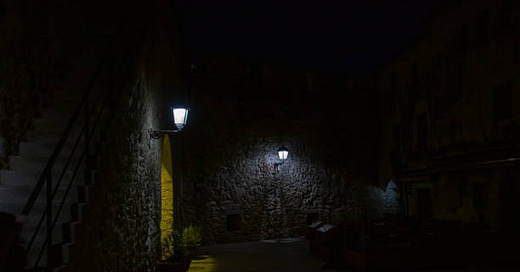You can tell a lot about a country by how it chooses to scare itself.
American horror is full of external threats, things that jump out at you, things that break into your house, things you must defend your family against. Terror the Second Amendment can deal with. Japanese horror however rests in the internal projected outwards, psychology made flesh, a creeping, inevitable fear that cannot be fought. The dark patch creeping across the roof is your guilt and it will get you in the end. No messing.
So what about us Scots? Existential threats and walking neurosis don’t bother us much. What really gets under our skin, it seems, is a know-it-all.
Janice Galloway once described Scotland as:
a country where the standard childhood training lists “showing off”
as the worst sin of all, a country whose church, family and education
systems used once to ring with the hurled accusation, “Who do you
think you are - someone special?”’
For centuries, and particularly since the Enlightenment, we have taken pride in our cumulative intellect. The list of things we claim to have invented, inspired or discovered is as lengthy as it is debatable. We may be a small nation but our impact has been large thanks, in part, to our brains. But you can take things too far. Our horror is rooted in our fear of hubris, particularly intellectual hubris, our hatred of people raising themselves onto pedestals.
This is most clearly seen in James Hogg’s Private Memoirs and Confessions of a Justified Sinner, the alpha and omega of Scary Scotland. All Robert Wringhim, the titular wrongdoer needs is the assurance that he is of the elect, on the topmost rung of God’s ladder, to start sinning with a fervour that would make most rock stars blush. High and haughty, his fall is all the harder.
But why should that be our biggest fear, our worst sin? I suggest it’s because at our core we are a Northern European community. The supernatural takes on a very different form when you move from the Mediterranean to the Arctic. Our collective unconsciousness didn’t develop amongst olive groves and classical columns, it grew out of the barren landscapes and bitter winters that gave rise to sagas and gods who drink, fight and cavort and that echo lives on in our stories. Once the dead moved with us in the mist and the mountains. Organised monotheism with its rigid hierarchies and endless order was transplanted here from warmer climes. The North has always been more fluid, more chaotic, more impartial. Valhalla – an afterlife with a free bar and no hangover. How did Scotland not invent that?
The fact that our cultural compass points north rather than south can most easily be demonstrated through a figure who again and again turns up to topple pedestals and bring everyone crashing back to an even baseline: The Devil.
Classical images of the Devil have been shaped by two poets. Dante gave us Satan locked in the final circle of Hell, masticating eternally on Judas, Brutus and Cassius. Milton gave us the tragic Lucifer, the fallen angel who refused to serve. His character and appearance mirror the trajectory of the idea through Christian history – an abstract adversary given form, a stick with which to threaten mankind, a warning, a lesson. Impressive, sure, but you never once imagine bumping into Lucifer on the backroads to Blairgowrie.
What of our poets, our writers and artists? What do Robert Burns, James Hogg and James Robertson make of him when they invite him to stroll through their pages?
There’s none of the church’s super-villain about their Devil. He’s almost human, an extrapolated version of ourselves reminiscent of the Norse deities – flawed, mischievous, lonely. He plays the bagpipes in ‘Tam O’Shanter’, the life and soul of the party, the host, MC Clootie. He’s Gil-Martin in … Justified Sinner, possessed of unnatural powers but all too human in his desire to trick, cheat and manipulate. More recently he has supped with Gideon Mack, walking around in battered trainers like David Tennant’s Dr Who’s evil twin brother.
The veil between our world and theirs is thin up here, North of the Wall. There is much traffic between the two. The Deil slips in and out to play his games and he picks his targets well. Our protagonists never triumph. There’s no passing through his realm to purgatory and paradise. Janet is thrawn. Gideon Mack disappears. Robert Wringhim hangs. Drunk Tam only survives because his horse is the brains of the outfit. He stumbles home to his wife a chastened man, all pretensions terrified out of him. From that day on, we suspect, Tam will be a model husband, shunning both boozy pals and cutty sarks.
The Deil is there to bring us back into line. Be careful, boys and girls, not to get too pompous lest you attract his attention. The Devil walks among us in these demented lands.





Great stuff Iain.